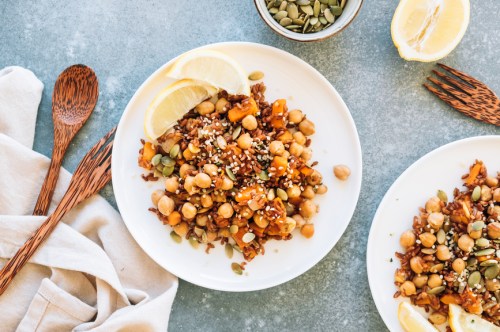Our editors independently select these products. Making a purchase through our links may earn Well+Good a commission
‘I’m a Cardiologist, and These Are the 7 Best Sources of Protein I Recommend Eating for Heart Health and Longevity’
Cardiologist Alejandro Junger MD, gives his list of best protein for heart health and longevity, inspired by Blue Zones eating habits.

While life is certainly bound to throw curveballs that we cannot anticipate or prevent, it still holds true that the food habits we live by now play a major role in how we will live and age in the future. It’s something cardiologist Alejandro Junger MD, founder and medical director of the Clean Program and bestselling author of Clean ($10), preaches to patients on a regular basis.
Experts in This Article
cardiologist and founder of the Clean Program
“When thinking of heart health and longevity, I look at the diets of the populations in the world’s Blue Zones, where people live the healthiest and longest lives,” Dr. Junger says. In Blue Zones, people regularly live to be over 100 in good health. Unfortunately, in the U.S., the number one cause of death is cardiovascular disease—a condition largely preventable through food and lifestyle habits.
While it’s important to be cognizant of nutrient needs as a whole, protein in particular is one area where many Americans could use a bit of heart-healthy intel. Meat, eggs, and dairy remain the most popular protein sources in the U.S.—a stark contrast to what Dr. Junger says most people in Blue Zones typically eat. What he recommends looks a bit different. Here, he shares the best protein for heart health.
The best protein for heart health, according to a top cardiologist
1. Plant proteins such as beans, lentils, chickpeas, and tofu
No matter what Blue Zone it is—Sardinia, Italy; Okinawa, Japan; Nicoya, Costa Rica; Ikaria, Greece; or Loma Linda, California—Dr. Junger says something that they have in common is that plants make up the vast majority of their diets, protein included. Beans, lentils, chickpeas, and tofu are all plant-based proteins that are common in Blue Zones, depending on the region. “Plant proteins are ‘entouraged’ with other phytonutrients that promote heart health, such as polyphenols and antioxidants,” Dr. Junger says.
“The longevity all-star food is beans. If you’re eating about a cup of beans a day, it’s probably worth an extra four years of life expectancy,” Blue Zones expert Dan Buettner previously told Well+Good. One reason for this is because they’re so good for your heart, scientifically linked to lowering blood pressure. Chickpeas are also a particularly good heart-healthy protein because they’re rich in soluble fiber and help keep blood sugar levels steady.
Watch the video below to learn more about why chickpeas are such a heart-healthy protein source:
2. Nuts
Nuts are another excellent form of protein for heart health, says Dr. Junger, and they are also eaten abundantly in Blue Zones around the world. The reason why nuts are so good for your ticker is because they’re high in antioxidants (which helps with blood flow) and monounsaturated fats (linked to a decreased risk of heart disease).
Different types of nuts have their own unique nutritional profile, but something they all have in common is that they’re high in protein and good for your heart.
3. Wild fish and game
Though people in Blue Zones largely eat plant-based foods, Dr. Junger is not against animal proteins. In fact, he says wild fish and game (such as bison or free-roaming cows) are both good sources of omega-3 and omega-6 fatty acids, directly linked to decreasing the risk of heart disease. How does, however, emphasize that it’s important to consider where your fish or animal proteins are being sourced from.
“What [people in Blue Zones] all have in common is a diet rich in plants—and when it comes to animal protein, they get it from animals that are living in the wild, just as nature designed them to live,” he says. “[They eat] fish from the oceans or rivers and wild game that lives naturally and grazes on pastures that are naturally occurring as opposed to feedlots where they are fed unnatural diets,” he explains.
When buying fish, Dr. Junger recommends prioritizing wild-caught. There are also certain certifications to look for to ensure that the fish you’re buying is sustainably sourced. Most notably is the Marine Stewardship Council, which takes into account codes and guidelines provided by the UN Food and Agriculture Organization (FAO), ISEAL, and the Global Sustainable Seafood Initiative (GSSI). The Aquaculture Stewardship Council is another label to look for, which is an independent non-profit that has a certification for fish farms.
Buying meat that is regenerative indicates that the animals were grass-fed, lives on certified organic pastures, and none of the feed was sprayed with synthetic pesticides. Grass-fed meat means that the animals ate grass as opposed to feed.
As you can see, the list of protein for heart health is vast and varied. This allows for plenty of ways to switch up what you eat. What’s important to keep in mind, according to Dr. Junger, is choosing protein sources that are in tune with nature. “Eating real foods as opposed to ‘food-like’ or ‘edible’ products is at the core of being in tune with nature,” he says. “When it comes to proteins, it is not different.”
Oh hi! You look like someone who loves free workouts, discounts for cult-fave wellness brands, and exclusive Well+Good content. Sign up for Well+, our online community of wellness insiders, and unlock your rewards instantly.










